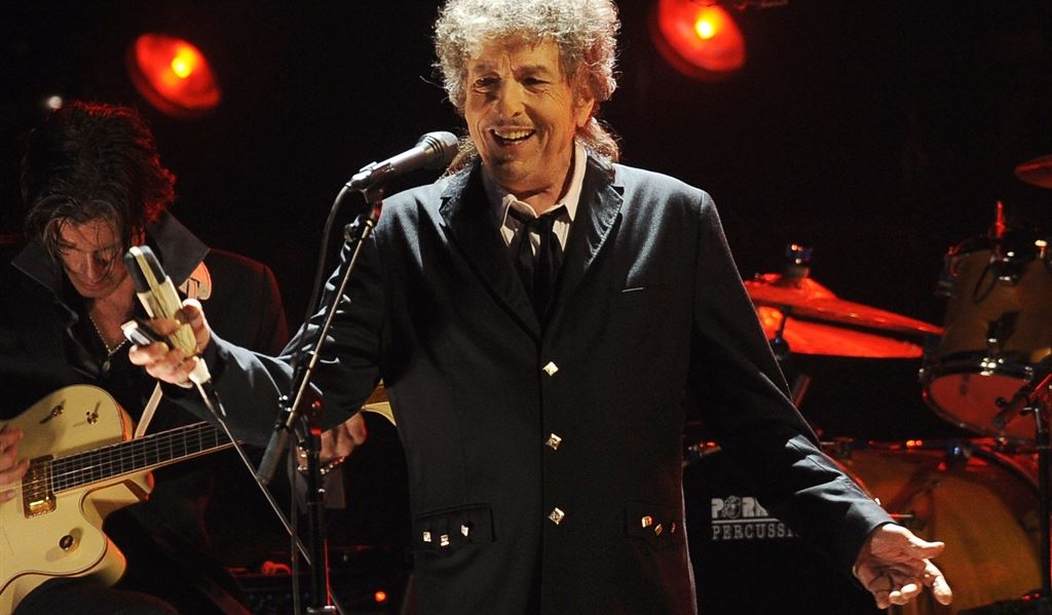Bob Dylan turned eighty this past Monday. In a world where geriatric rock stars are the norm — even Dave Grohl of Nirvana and Foo Fighters fame is on the high side of fifty — eighty still seems rather extreme to be making music. Yet here is Dylan, who last year maintained a presence on the Billboard charts nineteen years after being given a Lifetime Achievement Award at the Grammys.
Trying to explain Dylan and his place in music history, or for that matter American history period, to your average current music fan saturated with autotuned plastic performers is very much an embodiment of the meme about trying to smell the color 9. How could a raspy, nasally-voiced man armed with nothing but an acoustic guitar and a harmonica so much as sell a single record back in the days when actually buying the same was the only way one could listen to music on-demand, let alone lay claim to having transformed the world through his music?
Now, many RedState readers might reflexively recoil at the assertion that Bob Dylan has proved Andrew Breitbart correct for his entire career, but hear me out.
Reflect for a moment on the 1960s, a decade of utter turmoil that started out as anything but. John F. Kennedy was in the White House, a World War Two veteran as was most every man in his age group, yet somehow seeming fresher, more vibrant, and youthful than others in the same category. The Civil Rights movement was being embraced by the first batch of boomers. Vietnam was on the back burner of the national mindset. The Cold War threatened to grow very hot in 1962 with the Cuban missile crisis, but never boiled over.
And here was Dylan, giving voice to the boomers even though he himself was older than they. He sang of peace, of human rights, of an answer blowing in the wind. Dylan was a lightning rod, a focal point for those seeking freedom from the restrictive 1950s. He was a spokesperson for social justice long before it turned into cancel culture and overgrown children crying out for safe spaces.
Then Kennedy was assassinated and the decade plunged into violence and turmoil. Dylan, whether in response to this or as a result of following his own muse regardless of commercial impact, created a bit of his own turmoil. He sang “don’t follow leaders” as he went out of his way to discourage anyone seeking to make him one, angering folk music purists by switching from folk to rock overnight, switching his lyrical palette to relationships as the primary focus instead of a supporting act to his societal observationalism and commentary. He took full advantage of his position in popular music and society by doing as he pleased, granting few interviews and providing no indication of caring in the least whether people kept up with his ever-changing artistic persona. Dylan stayed this way throughout the 1970s, at the end of which he completely turned his fan base on its head by embracing evangelical Christianity.
The 1980s and 1990s found Dylan retreating from the public consciousness, his days of making new fans fading away – although the faithful remained. This continued into the new century, Dylan seemingly taking wry delight in confounding fans and critics alike with projects that seemed utterly un-Dylanish: a Christmas album styled after those of the late 1950s, a three-disc album covering American standards that would have sounded perfectly normal had Frank Sinatra come back to do the vocals. Then, last year as COVID wreaked its havoc across the globe, Dylan surprised everyone by rolling out a seventeen-minute tone poem dedicated to President Kennedy’s assassination that in its course touched upon American cultural icons such as Wolfman Jack and The Eagles.
The late, deeply lamented Andrew Breitbart famously said that politics is downstream from culture, which should serve as a warning to conservatives ever-increasingly isolating themselves from culture and society as the two lurch ever leftward, thus leaving no resistance to this lurch. Bob Dylan is the living embodiment of Breitbart’s truism. His greatest gift to culture during the past sixty-plus years of his being in the public eye has been his quiet insistence on making people think. Dylan has defied easy categorization and ready definition. He has defined the human condition by writing the most achingly real love songs imaginable, be they of love found or love lost. Dylan has wasted no time creating an image, instead offering his body of work as the sole measuring stick of its creator. He is a shaggy, craggy, curly-haired lion in winter, one still capable of pulling off surprises while continuing to give nothing away. Some people believe themselves to be God’s gift to humanity. Bob Dylan actually is one. We would be wise to follow his lead by simply being unapologetically ourselves.














Join the conversation as a VIP Member